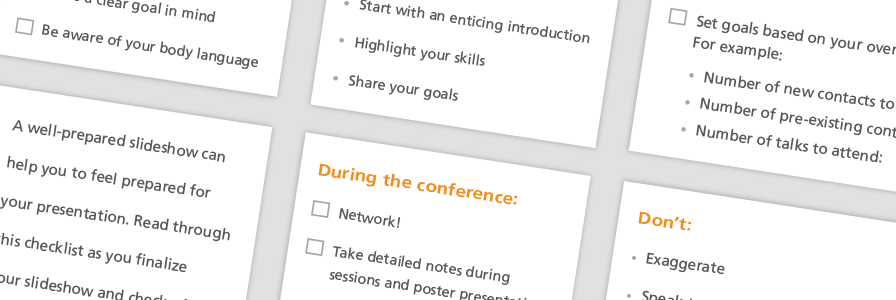How to Choose Which Scientific Conferences to Attend

If you’re at the start of your scientific career, attending conferences and other scientific events is an exciting way to network, find inspiration, connect with potential employers, and meet with collaborators. But there are so many scientific events to choose from; which ones should you attend to keep up with your field without draining your energy and budget? Read on to find out how to choose the best conferences for you to attend.
When I was a PhD student at the University of Manchester studying developmental biology, I had opportunities to go to both big international conferences and smaller-scale meetings, such as summer school/workshops. I enjoyed the smaller ones a lot more, as it allowed me to get to know and engage with the attendees a lot easier and better. In fact, one of the Key Opinion Leaders at a summer school eventually offered me a postdoc position in his lab and brought me into the stem cell field. It was a life changing experience!
YaoYao Chen, PhD, Associate Director, R&D, UK, at STEMCELL Technologies
Why Attend Scientific Conferences?
There are many reasons to attend scientific conferences, with networking being the most common. But there are numerous other benefits to attending them: you can learn how and why someone was motivated to pursue a particular line of research or career path, see if anyone has interesting job opportunities, gain respect as a potential collaborator, seek advice on how to move forward in your career, learn how (and sometimes how not) to present to large crowds, find inspiration from others at various stages of their careers, and hear about advances in specific research fields or about updates in standards. If you manage to squeeze in some skiing, hiking, wine tasting, or snorkeling at the same time, that counts as another perk of attending conferences. There is no harm in taking a break from science and boosting your morale by jumping on these types of activities.
Types of Scientific Conferences and Meetings
Different types of gatherings align better with different goals. Most types of scientific conferences, symposia, or meetings, consist of a series of gatherings with a formal agenda. Each involves bringing people with similar interests together to share information, find solutions, and learn about progress in a specific field:
- Annual meetings tend to be large and international, but may also be national or regional. They are usually hosted over several days by associations, societies, or institutes that bring together members of—or people with an interest in—the particular organization.
- Examples of large conferences that fall into this category include the American Association of Cancer Research (AACR) Annual Meeting, the American Association for the Advancement of Science (AAAS; publishers of Science and other journals) Annual Meeting, and the International Society for Stem Cell Research (ISSCR) Annual Meeting.
- Conferences devoted to certain subfields are also commonly held by associations or societies. They are generally smaller than annual meetings, but are often still held in a central location over a number of days.
- Examples include the AACR’s Special Conference on Pancreatic Cancer, which has been held annually since 2015 for scientists studying pancreatic cancer, or the AAAS Science, Technology and Human Rights Conference, which brings together researchers and others with an interest in human rights challenges in science and technology.
- Symposia are usually smaller, more intimate events with even more focus on a particular area.
- For example, The Society for Canadian Women in Science and Technology (SCWIST) holds an annual symposium specifically for young scientists to showcase their research, and the American Society for Cell Biology (ASCB) hosts several symposia each year, focused on specific topics such as “Emerging Therapies at the Intersection of Genetic and Cellular Technologies” and “Translating Discoveries”.
- Workshops and seminars are generally the smallest type of scientific gathering; a workshop is a meeting where a group of people learn about something through insightful discussions and activities, whereas a seminar is usually a small, discussion-based meeting.
- Many professional associations and institutes run seminars and workshops throughout the year, such as the Canadian Light Source (CLS) seminar series, which provide insight into science research.
- Trade shows or expos are a place for science vendors to showcase their products. Trade shows are sometimes part of a larger conference—large conferences usually have an exhibition hall for vendors to connect with potential customers—but they can also be standalone events.
- As an example, the American Society of Human Genetics (ASHG) runs one of the largest scientific trade shows, occupying an entire exhibition hall, at its annual meeting each year.
As a graduate student at the University of Victoria studying the structure of glycans on monoclonal antibodies, I chose to attend conferences that had either a structural biology or glycobiology focus. However, I didn’t have a huge budget for traveling, so attending conferences that were close to home was also important to me.
Kathryn Loydall, PhD, Scientific Marketing Specialist at STEMCELL Technologies
Other popular scientific conferences or meetings include:
- The American Association of Immunologists (AAI) Annual Meeting
- The International Society of Stem Cell Research (ISSCR) Annual Meeting
- International Behavioral Neuroscience Society (IBNS) Annual Meeting
- The biennial Federation of European Neuroscience Societies (FENS) Forum
- The annual Society for Neuroscience (SfN) meeting
- Cell Bio (hosted by the ASCB and EMBO)
Make a (Long) List
Now, sit down with a notebook, grab a hot drink and some snacks, and start writing down every conference or meeting that appeals to you. Write down any conferences where you:
- Have the opportunity to present
- Are exposed to leaders in your field of research
- Can meet co-authors and collaborators in person
- Will see what career opportunities are available
- Are interested in the agenda
- Can apply for travel awards
- May have a good tourist experience!
You will end up with a large list. Your job now is to whittle that list down to a reasonable number of conferences based on the following.
Networking and Conference ToolKit
Browse our collection of downloadable tools to prepare for a networking event, including best practices for your LinkedIn profile and your elevator pitch.
Choose Relevancy
Ask yourself, “what’s relevant to me, right now?”. Relevance depends a lot on where you are at in your studies or career. If you are new to your studies, an opportunity to practice presenting or to add an oral or poster presentation to your CV or scholarship applications may be relevant. If you are about to graduate, meeting potential employers is likely highly relevant. If you have just set up your own lab, then networking to find collaborators might be highly relevant. If you are happy with your network, and already have solid plans for any upcoming projects, then you may just want to travel to somewhere new and exciting to talk to like-minded individuals in your research field.
Really think about where you are in your career and mindset and then start crossing conferences off the list based on this exercise.
As a graduate student unsure of my next steps after graduation, I chose to attend conferences with sessions dedicated to networking and careers in science. This gave me the opportunity to meet and learn from researchers whose careers I admire and respect, and set me up with lifelong mentors that I still stay in contact with today.
Kristina McBurney, PhD, Senior Manager, Scientific Communications at STEMCELL Technologies
Balance Your Time and Budget
You now have a shortlist, although it could still be on the longer side. Make a spreadsheet and list every conference in your shortlist in one column, ordering them by date. Look at the agenda or schedule of each conference on your list to determine how long you’ll have to spend at each one, and which activities you would like to take part in. Next, create other columns labeled as travel requirements, accommodation costs, tourism costs, etc. Work out how much each conference will cost and then compare the total cost to your annual budget. Seeing the numbers written down will help you to realize which conferences are within your budget. Strike off ones that do not fit into your budget from your shortlist.
At the same time, write down how many days each conference lasts. Do you have enough time to attend all of them? Will you need to balance other projects alongside attending the meetings? Adjust your list accordingly.
Consider Your Comfort Levels
Networking is important, but keep in mind that it is perfectly acceptable to say “no” to conferences if you’re feeling overwhelmed or overworked. Stick to smaller, virtual, or more local scientific conferences if you are not feeling ready. Many scientific conferences offer a virtual attendance option, which is a good way to get a taste of the conference without overextending yourself. Virtual conferences are also a good way to balance your time and budget.
Add another column to your spreadsheet to note which conferences offer a virtual option. If it makes sense to you, commit to attending certain virtual conferences only.
By this point you should have a relevant, succinct list of conferences to attend that make the most sense for your budget, time, and personality.
Make the most out of attending your conferences by looking at these other helpful resources:
10 Tips for Attending Scientific Conferences
Plan ahead and be prepared for the next conference you attend to ensure you’re maximizing the benefits.
Six Immunologists and Science Communicators You Should Follow
Social media is an invaluable tool when it comes to connecting with people and staying updated on events, including conferences.
Attending a Virtual Conference
Learn how to navigate virtual conferences with these tips and resources.
Visit Virtual Conference Exhibitions from STEMCELL
Attend scientific talks, browse posters, and join discussions on immunology, pluripotent stem cells, and organoids.






